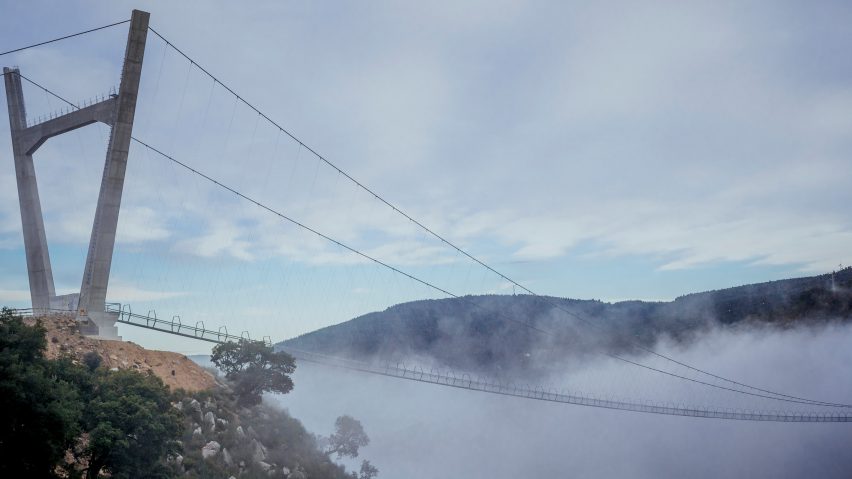A pedestrian suspension bridge that claims to be the longest in the world, named 516 Arouca and measuring 516 metres in length, has opened in northern Portugal.
Built in the Arouca Geopark, the bridge is suspended 175 metres above the Paiva river and links two hills with granite cliff faces.
The bridge was built by the Institute for Research and Technological Development for Construction, Energy, Environment and Sustainability as a tourist attraction for the Arouca area, providing views across the Pavia Gorge and toward the nearby Aguieiras Waterfall.
It is located next to the Paiva Walkways, an eight-kilometre-long trail that winds through the Arouca hills.
"A remarkable work of national engineering and will certainly be one of the most iconic structures in the municipality of Arouca and in the country and that will surely become a landmark of modernity," said Arouca's mayor Margarida Belém.
The structure is now Europe's longest pedestrian suspension bridge, surpassing Switzerland's 494-metre Charles Kuonen Bridge, which was completed in 2017.
The developers believe that the bridge is also the world's longest pedestrian suspension bridge, although the 567-metre Baglung Parbat Footbridge in Nepal also claims the title.
However, the Nepalese crossing is a "simple" or catenary suspension bridge, featuring a deck supported by, and following the same curve as, free-hanging cables.
By contrast, a regular suspension bridge, like the Portuguese one, features a deck supported by cables slung from elevated towers. The deck and cables follow different curves.
"It is the largest in the world, as we always said," said a representative for the Portuguese local authority. "With 516 meters in length, [and] an altitude from the water level of 175 meters, [it is] the highest in terms of construction and with more capacity."
Concrete towers in the form of inverted A-shapes mark the landing points of the bridge and support two steel suspension cables, known as tensile cables, that support the steel walkway.
The suspension cables were fitted to the two highest points of the concrete towers and tied to the walkway decks with vertical cables.
The walkway was built as a collection of 127 interlocking metal-gridded decks that function as individual cells and are each connected to the suspension cables at two points.
Other record-breaking bridges include this glass-bottom bridge in China completed last year that currently holds the title of the world's longest glass-bottom bridge, taking the title from this 488-metre-long bridge also in China.
Photography is courtesy of Arouca Municipality.

